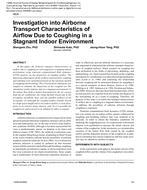Click here to purchase
The thermal performance of a building envelope can highly impact the overall performance and energy efficiency of the building. It has been shown that the thermal resistance (R-value) of a building envelope can be affected by thermal bridging sources. Hence, it is important to accurately determine the R-value of building envelopes with thermal bridging components. In this project we employed a three dimensional heat transfer module of COMSOL Multiphysics to evaluate the thermal performance and calculating the thermal resistances of three steel stud wall assemblies. The thermal bridging effect of steel stud wall assemblies were also calculated. The wall assemblies were drawn in Solidworks and then imported to COMSOL Multiphysics, the materials properties were assigned and corresponding boundary conditions were applied on the wall assemblies. Finally based on the calculated heat flow through the walls and the average surface temperatures, the thermal resistances of the wall assemblies were calculated. The wall assemblies were also fabricated and the thermal properties of the insulation materials were measured at the NRC’s Heat Flow Meter and used in COMSOL Multiphysics. The steel stud wall assemblies were tested in the NRC’s Guarded Hot Box and the results were used to benchmark the numerical method that was employed. The effects of eliminating the steel stud on the thermal performance of the wall assemblies were studied. The room side temperature analysis was also conducted.
Citation: Thermal Buildings XIV 2019
Product Details
- Published:
- 2019
- Number of Pages:
- 9
- Units of Measure:
- Dual
- File Size:
- 1 file , 3.1 MB
- Product Code(s):
- D-Bldgs19-026


